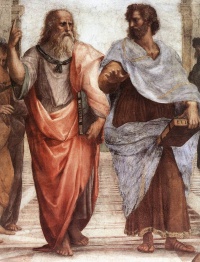Canon
From The Art and Popular Culture Encyclopedia
| Revision as of 18:47, 19 April 2007 84.198.171.89 (Talk) (→A canon) ← Previous diff |
Current revision Jahsonic (Talk | contribs) |
||
| Line 1: | Line 1: | ||
| + | [[Image:Mona_Lisa.jpeg|thumb|left|200px|'''''Mona Lisa''''' (c. 1503–1519) is an [[oil painting]] by [[Leonardo da Vinci]], one of the most [[famous painting]]s in the world.]] | ||
| + | [[Image:Plato and Aristotle in The School of Athens painting by Raphael.jpg|thumb|right|200px| | ||
| + | Greek philosophers as [[dead white men]] | ||
| + | <br>Illustration: Plato (left) and Aristotle (right), a detail of ''[[The School of Athens]]'', a fresco by [[Raphael]].]] | ||
| {{Template}} | {{Template}} | ||
| - | == A canon == | + | '''Canon''' is the "accepted" or "official" version or type of something. In the context of this wiki, a group of [[artistic work]]s that are generally accepted as representing a field. The concept is derived from the [[biblical canon]]. It is a concept which has been attacked (esp. the [[Western canon]]) since the postmodern era but is regarded as a necessary evil in the context of [[education]]. A writer or artist has been canonized if one can point to him as a [[mononym]], by his first or last name only. For example, there is only one [[Beckett]], [[Samuel Beckett]]. |
| - | Literature: [[Martin Amis]] - [[Georges Bataille]] - [[Charles Baudelaire]] - [[Jorge Luis Borges]] - [[Céline]] - [[Dostoevsky]] - [[Alain Robbe-Grillet]] - [[E. T. A. Hoffmann]] - [[Franz Kafka]] - [[Stephen King]] - [[Alberto Moravia]] - [[Edgar Allan Poe]] | + | ==Etymology== |
| - | + | From Old French ''canon'', from Latin ''canōn'', from Ancient Greek ''κανών'' (kanṓn, “measuring rod, standard”), akin to ''κάννα'' (kánna, “reed”), perhaps from Semitic (compare Hebrew ''קָנֶה'' (qane, “reed”)). See also ''cane''. | |
| - | Film: [[Woody Allen]] - [[Pedro Almodóvar]] - [[Catherine Breillat]] - [[Luis Buñuel]] - [[Roger Corman]] - [[David Cronenberg]] - [[Michael Haneke]] - [[Juzo Itami]] - [[Patrice Leconte]] - [[Spike Lee]] - [[David Lynch]] - [[Radley Metzger]] - [[François Ozon]] - [[Roman Polanski]] - [[Nicolas Roeg]] - [[Jacques Tati]] - [[Alex van Warmerdam]] - [[Michael Winterbottom]] | + | ==See also== |
| - | + | *[[Abecedaria]] | |
| - | Music: [[George Clinton]] - [[Serge Gainsbourg]] - [[Kraftwerk]] - [[Larry Levan]] - [[Lee Perry]] - [[Fela Kuti]] - [[Arthur Russell]] - [[Neil Young]] | + | *[[Dead white males]] |
| - | + | *[[Quarrel of the Ancients and the Moderns]] | |
| - | Visual arts: [[Arcimboldo]] - [[Hans Bellmer]] - [[Arnold Böcklin]] - [[Hieronymus Bosch]] - [[Guy Bourdin]] - [[Luigi Colani]] - [[Gustave Courbet]] - [[John Currin]] - [[Honoré Daumier]] - [[Gustave Doré]] - [[Jean-Léon Gérôme]] - [[Francisco de Goya]] - [[Hans Baldung Grien]] - [[Matthias Grünewald]] - [[Hokusai]] - [[Alfred Kubin]] - [[Tanino Liberatore]] - [[Hans Memling]] - [[Carlo Mollino]] - [[Giovanni Piranesi]] - [[Félicien Rops]] - [[Odilon Redon]] - [[Roland Topor]] - [[Andy Warhol]] - [[Ettore Sottsass]] | + | * [[Western canon]], the books, music, and art that have been the most influential in shaping Western culture |
| - | + | * [[Film canon]], the limited number of masterpieces by which all other films are judged | |
| - | Theory: | + | *[[High culture]] |
| - | [[Guillaume Apollinaire]] - [[Aristotle]] - [[Gaston Bachelard]] - [[Mikhail Bakhtin]] - [[Georges Bataille]] - [[Roland Barthes]] - [[Charles Baudelaire]] - [[Simone de Beauvoir]] - [[Walter Benjamin]] - [[Pierre Bourdieu]] - [[Gilles Deleuze]] - [[Guy Debord]] - [[Denis Diderot]] - [[Umberto Eco]] - [[Kodwo Eshun]] - [[Michel Foucault]] - [[Sigmund Freud]] - [[Richard von Krafft-Ebing]] - [[Gershon Legman]] - [[Karl Marx]] - [[Nietzsche]] - [[Camille Paglia]] - [[Marquis de Sade]] - [[Peter Sloterdijk ]] - [[Susan Sontag]] - [[Spinoza]] - [[David Toop]] - [[Parker Tyler]] - [[Paul Virilio]] - [[Ken Wilber]] - [[Raymond Williams]] - [[Slavoj Žižek]] | + | *[[Education]] |
| + | *[[Gay canon]] | ||
| + | *''[[No More Masterpieces]]'' (1938), an essay by Antonin Artaud | ||
| + | *[[Popular culture studies]] | ||
| + | *[[Contemporary liberal pluralism]] | ||
| + | *[[School of resentment]] | ||
| + | *[[Canonization]] | ||
| + | {{GFDL}} | ||
Current revision


Illustration: Plato (left) and Aristotle (right), a detail of The School of Athens, a fresco by Raphael.
|
Related e |
|
Featured: |
Canon is the "accepted" or "official" version or type of something. In the context of this wiki, a group of artistic works that are generally accepted as representing a field. The concept is derived from the biblical canon. It is a concept which has been attacked (esp. the Western canon) since the postmodern era but is regarded as a necessary evil in the context of education. A writer or artist has been canonized if one can point to him as a mononym, by his first or last name only. For example, there is only one Beckett, Samuel Beckett.
Etymology
From Old French canon, from Latin canōn, from Ancient Greek κανών (kanṓn, “measuring rod, standard”), akin to κάννα (kánna, “reed”), perhaps from Semitic (compare Hebrew קָנֶה (qane, “reed”)). See also cane.
See also
- Abecedaria
- Dead white males
- Quarrel of the Ancients and the Moderns
- Western canon, the books, music, and art that have been the most influential in shaping Western culture
- Film canon, the limited number of masterpieces by which all other films are judged
- High culture
- Education
- Gay canon
- No More Masterpieces (1938), an essay by Antonin Artaud
- Popular culture studies
- Contemporary liberal pluralism
- School of resentment
- Canonization

